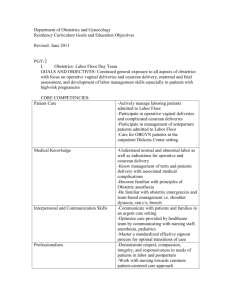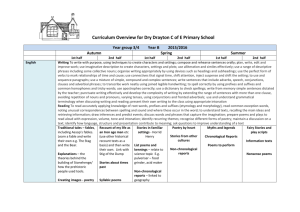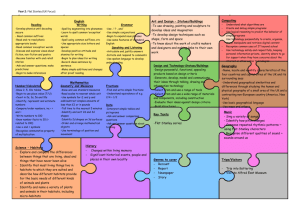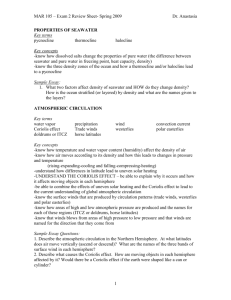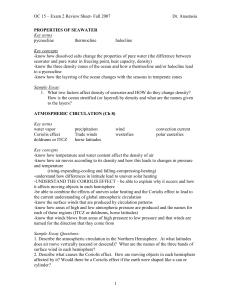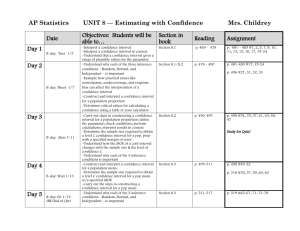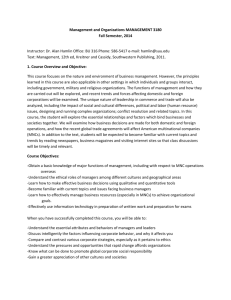PGY1 Objectives
advertisement
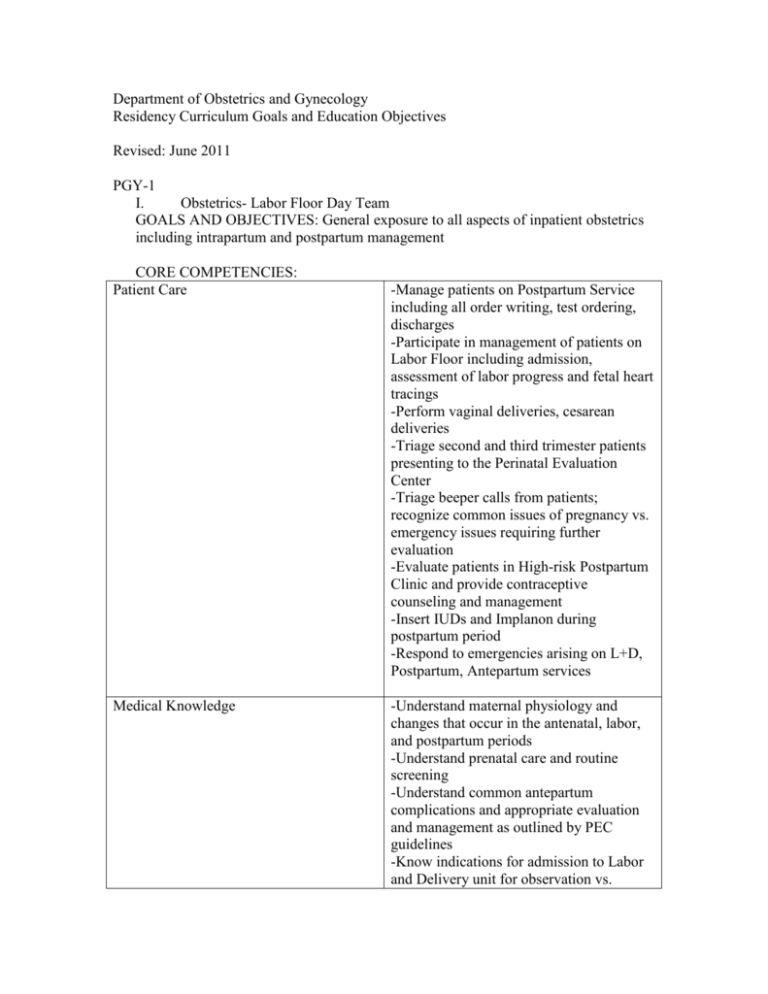
Department of Obstetrics and Gynecology Residency Curriculum Goals and Education Objectives Revised: June 2011 PGY-1 I. Obstetrics- Labor Floor Day Team GOALS AND OBJECTIVES: General exposure to all aspects of inpatient obstetrics including intrapartum and postpartum management CORE COMPETENCIES: Patient Care Medical Knowledge -Manage patients on Postpartum Service including all order writing, test ordering, discharges -Participate in management of patients on Labor Floor including admission, assessment of labor progress and fetal heart tracings -Perform vaginal deliveries, cesarean deliveries -Triage second and third trimester patients presenting to the Perinatal Evaluation Center -Triage beeper calls from patients; recognize common issues of pregnancy vs. emergency issues requiring further evaluation -Evaluate patients in High-risk Postpartum Clinic and provide contraceptive counseling and management -Insert IUDs and Implanon during postpartum period -Respond to emergencies arising on L+D, Postpartum, Antepartum services -Understand maternal physiology and changes that occur in the antenatal, labor, and postpartum periods -Understand prenatal care and routine screening -Understand common antepartum complications and appropriate evaluation and management as outlined by PEC guidelines -Know indications for admission to Labor and Delivery unit for observation vs. Interpersonal and Communication Skills Professionalism Practice-Based Learning and Improvement delivery -Know stages of labor and be able to recognize normal and abnormal labor -Understand indications for operative and cesarean delivery -Understand intrapartum fetal heart tracing guidelines and interpret -Perform OB ultrasound for dating, biophysical profiles -Become adept at vaginal delivery and operative skills needed for cesarean delivery and laceration repair -Understand possible postpartum complications of normal vaginal delivery and cesarean delivery -Become familiar with post-operative care as relates to cesarean delivery -Understand physiology of breastfeeding and be able to troubleshoot common related issues -Learn principles of midwifery -Be able to counsel patients regarding contraceptive options -Work with Social Work team to optimize conditions for mother and child upon discharge -Work with nurse practitioners to provide streamlined care for Postpartum service -Communicate with patients and families in an urgent care setting -Optimize care provided by healthcare team by communicating with nursing staff, anesthesia, pediatrics -Master a standardized effective signout process for optimal transitions of care -Demonstrate respect, compassion, integrity, and responsiveness to needs of patients in labor and postpartum -Work with nursing towards common patient-centered care approach -Participate in Team Admissions -Participate in Risk Reduction initiatives -Participate in Quality Improvement and Patient Safety initiatives -Prepare to discuss management of patients on service using evidence-based medicine Systems-Based Practice -Participate in work and teaching rounds on Labor Floor and Postpartum Service -Attend Morning and Noon Conferences -Attend monthly M+M conferences to improve patient safety, learn from errors, become informed about complex medical issues -Use Baby Tracker system for data monitoring -Use Sunrise to generate concise and relevant discharge documents -Use EPIC to document phone triage calls and PEC encounters to facilitate follow up II. Night Float- Obstetrics GOALS AND OBJECTIVES: General exposure to all aspects of inpatient obstetrics including intrapartum and postpartum management Patient Care -Manage patients on Postpartum Service including all order writing, test ordering, discharges -Participate in management of patients on Labor Floor including admission, assessment of labor progress and fetal heart tracings -Perform vaginal deliveries, cesarean deliveries -Triage second and third trimester patients presenting to the Perinatal Evaluation Center -Triage beeper calls from patients; recognize common issues of pregnancy vs. emergency issues requiring further evaluation -Evaluate patients in High-risk Postpartum Clinic and provide contraceptive counseling and management -Insert IUDs and Implanon during postpartum period -Respond to emergencies arising on L+D, Postpartum, Antepartum services Medical Knowledge -Understand maternal physiology and changes that occur in the antenatal, labor, and postpartum periods -Understand prenatal care and routine screening -Understand common antepartum complications and appropriate evaluation and management as outlined by PEC guidelines -Know indications for admission to Labor and Delivery unit for observation vs. delivery -Know stages of labor and be able to recognize normal and abnormal labor -Understand indications for operative and cesarean delivery -Understand intrapartum fetal heart tracing Interpersonal and Communication Skills Professionalism Practice-Based Learning and Improvement Systems-Based Practice guidelines and interpret -Perform OB ultrasound for dating, biophysical profiles -Become adept at vaginal delivery and operative skills needed for cesarean delivery and laceration repair -Understand possible postpartum complications of normal vaginal delivery and cesarean delivery -Become familiar with post-operative care as relates to cesarean delivery -Understand physiology of breastfeeding and be able to troubleshoot common related issues -Learn principles of midwifery -Be able to counsel patients regarding contraceptive options -Work with Social Work team to optimize conditions for mother and child upon discharge -Work with nurse practitioners to provide streamlined care for Postpartum service -Communicate with patients and families in an urgent care setting -Optimize care provided by healthcare team by communicating with nursing staff, anesthesia, pediatrics -Master a standardized effective signout process for optimal transitions of care -Demonstrate respect, compassion, integrity, and responsiveness to needs of patients in labor and postpartum -Work with nursing towards common patient-centered care approach -Participate in Team Admissions -Participate in Risk Reduction initiatives -Participate in Quality Improvement and Patient Safety initiatives -Prepare to discuss management of patients on service using evidence-based medicine -Participate in work and teaching rounds on Labor Floor and Postpartum Service -Attend Morning and Noon Conferences -Attend monthly M+M conferences to improve patient safety, learn from errors, become informed about complex medical issues -Use Baby Tracker system for data monitoring -Use Sunrise to generate concise and relevant discharge documents -Use EPIC to document phone triage calls and PEC encounters to facilitate follow up III. Obstetrics- Antepartum GOALS AND OBJECTIVES: Exposure to inpatient and outpatient management of complicated pregnancies CORE COMPETENCIES: Patient Care Medical Knowledge Interpersonal and Communication Skills -Manage patients on Antepartum service including all order writing, test ordering, discharges, fetal monitoring interpretation -Triage second and third trimester patients presenting to the Perinatal Evaluation Center -Participate in outpatient prenatal care for high-risk pregnancies -Assist with consultation requested by other services and emergency department -Manage high-risk pregnancies in inpatient and outpatient setting and understand criteria for inpatient admission and discharge -Understand and perform fetal testing and surveillance (NST, BPP) -Perform OB ultrasound for dating -Understand common antepartum complications and appropriate evaluation and management as outlined by PEC guidelines -Understand risks and management of common medical complications in pregnancy i.e. diabetes, hypertension -Understand risks and management of surgical complications in pregnancy -Understand risks and management of obstetric complications of pregnancy i.e. PPROM, abruption, abnormal placentation, IUGR -Understand risks and management of multiple gestations -Understand fetal/ maternal indications for preterm delivery -Understand complications associated with extreme prematurity/ preterm delivery -Use consultants appropriately in inpatient and outpatient settings -Communicate with patients and families Professionalism Practice-Based Learning and Improvement Systems-Based Practice regarding plan of care on inpatient service -Optimize care provided by healthcare team by communicating with nursing staff, anesthesia, pediatrics/ NICU, social work, consultants -Assist with meaningful consultation to requesting services and coordination of care -Demonstrate respect, compassion, integrity, and responsiveness to needs of patients with complicated pregnancies -Offer a team-based approach to patientcentered care with attending, fellow, resident, nurse practitioner -Participate in work and teaching rounds on Labor Floor and Antepartum Service -Attend weekly MFM Division meeting -Attend weekly MFM Journal Club -Review all triage cases from PEC with senior resident/ attending and solicit feedback -Attend monthly M+M conferences to improve patient safety, learn from errors, become informed about complex medical issues -Use Baby Tracker system for data monitoring -Use Sunrise to generate concise/ comprehensive discharge documentation -Use EPIC to facilitate outpatient follow-up IV. Gynecologic Oncology GOALS AND OBJECTIVES: Exposure to all aspects of inpatient Gyn Oncology CORE COMPETENCIES: Patient Care Medical Knowledge Interpersonal and Communication Skills Professionalism -Manage patients on the Gyn Oncology inpatient service -Become adept at performing minor outpatient procedures, Benign and Oncologic including: laparoscopic BTL, LEEP, cold knife cone, hysteroscopy, D+E -Care for OBGYN patients in the outpatient Dickens Center setting -Wound care -Become familiar with post-op management of patients with concurrent medical illness and particularly with cancer diagnosis -Understand parameters for hemodynamic stability -Understand wound healing -Diagnose and treat common post-op complications -Recognize criteria for inpatient admission for women with gynecologic malignancies -Learn principles of chemotherapy -Know risk factors, diagnosis, treatment, and prognosis for gynecologic malignancies -Know staging for endometrial, ovarian, cervical cancer -Be familiar with common tumor markers for various ovarian pathology -Learn surgical technique and principles of laparoscopy, hysteroscopy -Perform as an integral team member and patient advocate -Provide compassionate care to patients who are critically ill, coping with cancer diagnosis and associated treatments -Provide compassionate support to family members of patients -Master a standardized effective signout process for optimal transitions of care -Demonstrate respect, compassion, integrity, and responsiveness to needs of Practice-Based Learning and Improvement Systems-Based Practice patients with complicated medical illness, cancer diagnoses -Offer a team-based approach to patientcentered care with attending, fellow, resident, nurse practitioner -Model attending physicians -Prepare cases for Gyn Oncology Conference -Attend monthly M+M conferences to improve patient safety, learn from errors, become informed about complex medical issues -Master the organizational skills necessary to provide care for an inpatient service -Introduction to hospice -Introduction to end-of-life issues -Learn use of ACGME database for case collection V. Benign Gynecology GOALS AND OBJECTIVES: Exposure to all aspects of gynecology CORE COMPETENCIES: Patient Care Medical Knowledge -Scrub on operating room cases, primarily outpatient cases, hysteroscopy, basic laparoscopy, D+E -Perform office LEEP in Dickens -Perform endometrial biopsy, IUD placement -Participate in postoperative care for Benign Gynecologic surgery patients as well as inpatient admissions -Participate in postoperative care for Urogynecology and REI patients as well as inpatient admissions -Attend to emergency room and inpatient consults and become familiar with gynecologic surgical emergencies and admissions under supervision of senior resident - Care for OBGYN patients in the outpatient Dickens Center setting -Participate in preop clinic: counsel patients regarding medical vs. surgical management of benign gynecologic conditions -Become familiar with Quant Book and review daily -Become familiar with abdominal wall opening and closure -Be familiar with suture selection -Know principles of electrosurgery -Understand and execute surgical procedures including: basic laparoscopy/ hysteroscopy, D+E, CKC -Know management of PUL, medical and surgical management of abnormal intrauterine pregnancy, ectopic pregnancy -Know diagnosis, medical and surgical management of lower tract infections vs. upper tract infections/ PID -Understand the menstrual cycle and differential diagnosis for alterations of Interpersonal and Communication Skills Professionalism Practice-Based Learning and Improvement Systems-Based Practice -Know options for treatment of acute vaginal bleeding -Postoperative management and treatment of complications -Work with other services to provide emergency and/or consult care appropriately under supervision of senior resident -Preop counseling and informed consent for hysteroscopy, laparoscopy, D+E, BTL -Offer a team-based approach to patientcentered care with attending, fellow, resident, nurse practitioner -Address advanced directives for gynecologic admissions -Review procedures and patient history prior to participation in surgical procedure -Respond to consult requests in a timely manner -Participate in medical student education -Participate in work and teaching rounds -Attend bi-monthly gyn preop conference -Attend monthly M+M conferences to improve patient safety, learn from errors, become informed about complex medical issues -Be familiar with criteria for inpatient hospitalization and review daily to ensure proper utilization of resources -Continue use of ACGME database for case collection VI. Internal Medicine- Inpatient Wards GOALS AND OBJECTIVES: General exposure to inpatient medicine therapy and patient management CORE COMPETENCIES: Patient Care Medical Knowledge Interpersonal and Communication Skills Professionalism Practice-Based Learning and Improvement Systems-Based Practice -Caring for male and female patients with chronic illness in an inpatient setting -Pathophysiology of common chronic diseases: hypertension, diabetes, cardiac, renal, gastrointestinal -Medical treatments for the above and pharmacology -Geriatric medicine -Taking a comprehensive history from patients with illness -Recording thorough H+Ps and progress notes -Appropriate utilization of ancillary resources -Attending daily rounds and conferences as scheduled by Department of Internal Medicine -Attend M+M conferences to improve patient safety, learn from errors, become informed about complex medical issues VII. Surgical Intensive Care Unit GOALS AND OBJECTIVES: General exposure to all aspects of intensive care of postoperative patients CORE COMPETENCIES: Patient Care Medical Knowledge Interpersonal and Communication Skills Professionalism Practice-Based Learning and Improvement Systems-Based Practice -Recognition of the critically ill patient that needs intensive care -Insertion of lines for invasive monitoring -Understand principles of mechanical ventilation, equipment, and settings -Understand invasive monitoring, hemodynamics -Fluid management and principles of transfusion -ACLS -Perform as an integral team member and patient advocate -Provide compassionate care to patients who are critically ill and communicating with families -Acting as effective member of team comprised of physicians of varying specialties -Participating in call schedule -Attending daily rounds as conducted by Unit Surgery or Anesthesia Chief/ Attending -Charting as per SICU department VIII. Emergency Medicine GOALS AND OBJECTIVES: General exposure to all aspects of emergency and acute care, including but not limited to: 1. Perform an appropriate focused history and physical exam 2. Demonstrate an appropriate differential diagnosis 3. Develop and carry out basic treatment plans through admission or discharge CORE COMPETENCIES: Patient Care Medical Knowledge Interpersonal and Communication Skills Professionalism -Learn evaluation and management of patients presenting with common types of illness and injury -Careful and thorough assessment of individual patients -Generate an appropriate and complete differential diagnosis for an undifferentiated patient -Develop and carry out a basic treatment plan -Suturing, lumbar puncture, splinting, I/D abcess -Keep medical record that is accurate, complete, timely, and appropriate -Generate an appropriate and complete differential diagnosis for an undifferentiated patient -Acquire the skills necessary to identify life-threatening conditions and presentations -Develop rational test-ordering strategies -Appropriate interpretation of ECGs, laboratory and radiologic testing -Data gathering: perform an appropriate focused history and physical exam -Demonstrate effective information exchange with patients, their families, and the emergency health care team -Develop vital interpersonal skills and strategies to work in a team environment -Being a reliable member of the Emergency Department team -Establishing good relationships in the ED -Strive for efficiency: effectively manage 1.5 patients/ hour -Introduce self to patient and/or family -Be respectful of patient’s privacy and confidentiality -Demonstrate good grooming, keeping rested and physically active to maintain health -Demonstrate respect, compassion, and integrity in all aspects of care Practice-Based Learning and Improvement Systems-Based Practice -Attending daily rounds as conducted by ED attending -Use appropriate information resources (ie texts, online websites, etc.) for care of patient -Ordering appropriate tests keeping in mind cost-effective care -Understand basic resources available for care of the emergency department patient -Understanding the role of the ED within the scope of inpatient admission/ continuity of outpatient care, including arranging appropriate ongoing care of patients once consulted upon, admitted to an inpatient service, or referred for further outpatient care IX. Ambulatory Women’s Health GOALS AND OBJECTIVES: General exposure to common women’s health issues in the outpatient setting, including but not limited to: 1. Radnor gynecology 2. Radnor urogynecology 3. Breast clinic 4. MFM Ultrasound 5. Genetics 6. 3701 Market Street—Division of General OBGYN 7. Dickens CORE COMPETENCIES: Patient Care Medical Knowledge -Perform routine well-woman examinations with familiarization of periodic health assessment based on age -Perform routine and high-risk OB care in the outpatient setting with attention to periodic screening -Exposure to women’s health care in comprehensive setting at Radnor -Exposure to non OBGYN specialties related to women’s health (Dermatology, Gastroenterology, Breast) -Exposure to specialized OBGYN evaluation in urogynecology, OB Ultrasound, Genetics -Periodic health assessment, age-based -Know screening tests and when appropriate -Common medical problems (diabetes, hypertension, hypercholesterolemia) and how they affect the reproductive system -Routine OB screening tests and timing -Become familiar with OB ultrasound— First trimester screening and Level 2 -Know screening options for genetic disorders in pregnancy -Know FTS, SS, integrated screening options in pregnancy -Understand mammogram screening guidelines and interpretation -Become familiar with benign breast disorders Interpersonal and Communication Skills Professionalism Practice-Based Learning and Improvement Systems-Based Practice -Understand diagnosis and treatment of breast cancer -Eliciting accurate, focused, appropriate history and performing thorough physical exam -Understanding the needs of the wellwoman presenting for an outpatient visit and incorporating education, preventive medicine into a meaningful encounter -Maintaining a professional appearance -Introducing self to patient and/or family -Develop and maintain habits of punctuality and efficiency -Work with attending physicians to shadow, model encounters -Demonstrate responsiveness to instruction and feedback -Use knowledge from textbooks, websites, and up-to-date studies to guide patient care -Use of Blackboard curriculum -Understand the basics of insurance, documentation, and coding principles -Understand patient referrals and interaction between ambulatory centers/ subspecialty clinics

